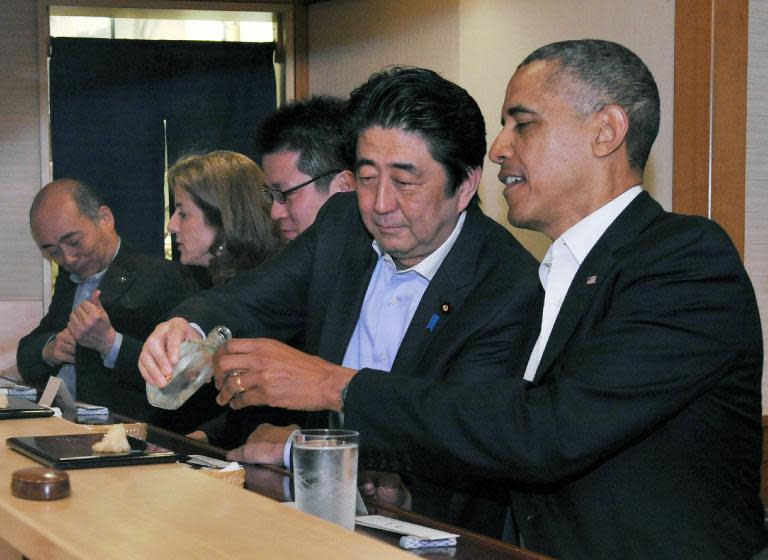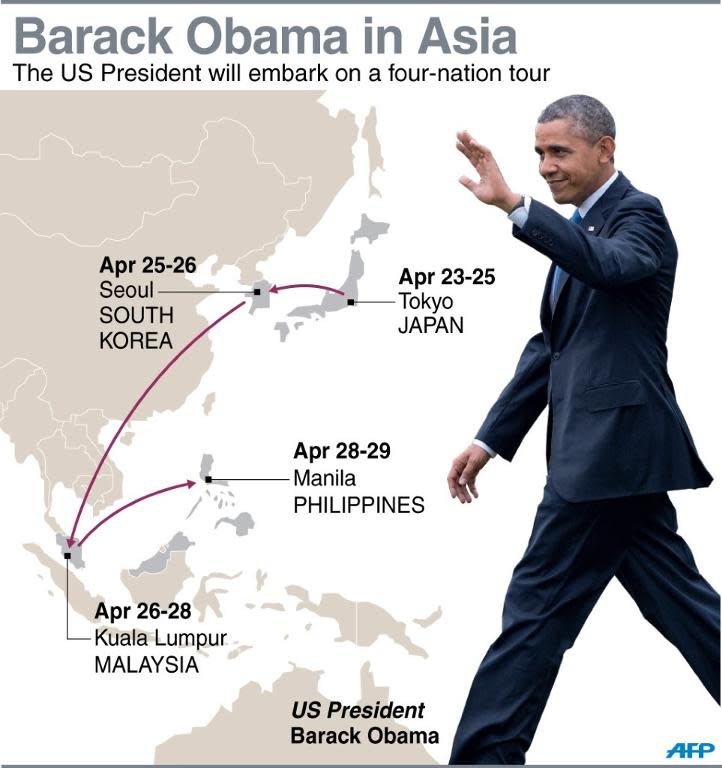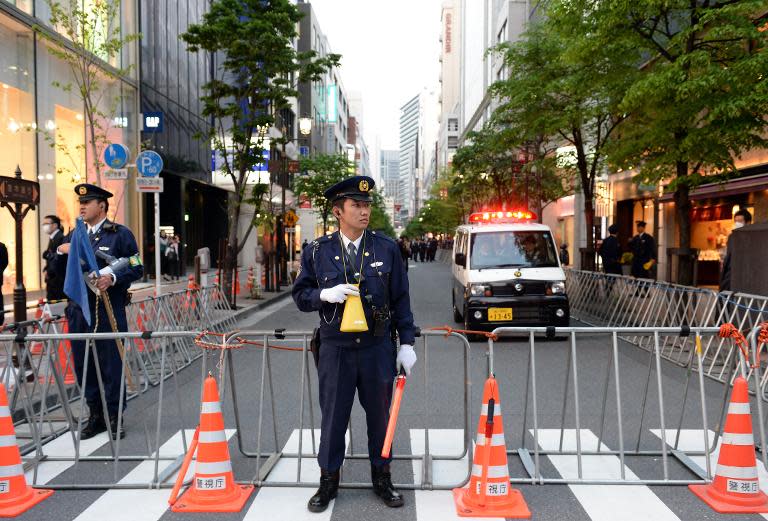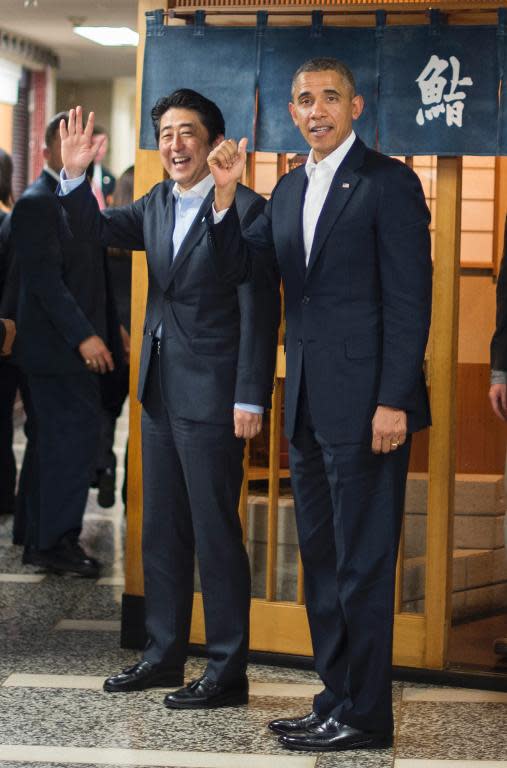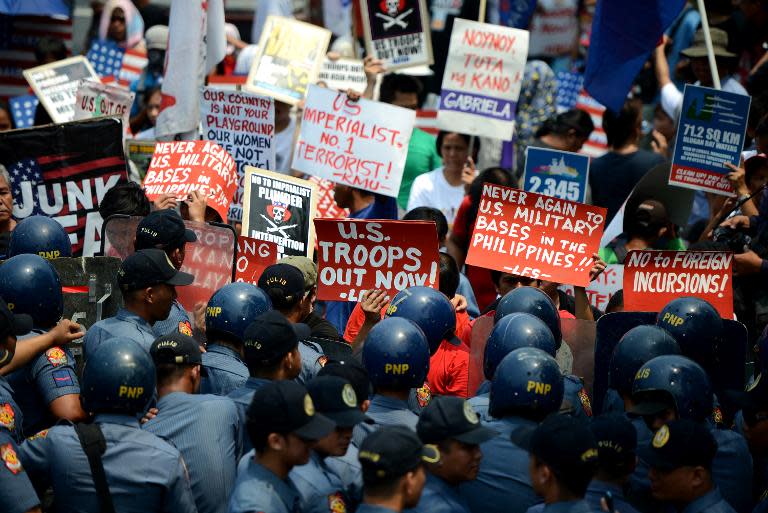Obama arrives in Japan for tension-filled Asia trip
US President Barack Obama dined on sushi Japan's Prime Minister Shinzo Abe said he described as the best in his life on Wednesday, a fitting start to an Asian tour dedicated to "rebalancing" US foreign policy toward Asia. Obama's arrival in Tokyo came as regional tensions boil over maritime territorial disputes and fears that North Korea could soon carry out a new nuclear test. The pair began the president's visit at Tokyo's three Michelin starred Sukiyabashi Jiro sushi restaurant, where gourmets flock to pay a minimum $300 for 20 pieces of sushi chosen by the 88-year-old patron, Jiro Ono. Obama was duly appreciative. "That's some good sushi right there," he remarked as he emerged from the restaurant after the 90-minute dinner and headed back to his hotel. Abe later told the Jiji news agency the president said the sushi was the best he'd ever had, and that they had discussed "a wide range of topics in a relaxed atmosphere." Obama's week-long tour of Asia, which will also take in South Korea, the Philippines and Malaysia, is being dubbed by the White House as a "rebalancing" eastward of US foreign policy, with reassurances that the United States remains committed to allies on the continent. A planned visit to the region last year was cancelled due to a domestic budget battle for the president. This time, before he had even touched down, Obama had made clear the US would support Tokyo if China took any hostile action over the two nations' territorial dispute over islands in the South China Sea. In an interview with Yomiuri Shimbun newspaper, he said the US would oppose any "unilateral attempts to undermine Japan's administration" of the Senkaku Islands, which Beijing claims as the Diaoyus. "The policy of the United States is clear -- the Senkaku Islands are administered by Japan and therefore fall within the scope of Article 5 of the US-Japan Treaty of Mutual Cooperation and Security," he said in the article. - Catalogue of tensions - Tensions in the region have been heightened in recent weeks. Earlier this week China seized a huge Japanese freighter over what a Shanghai court says are unpaid bills relating to Japan's 1930s occupation of vast swathes of the country. And on Tuesday, 150 lawmakers paid homage at a controversial Tokyo war shrine seen by neighbouring nations as a symbol of Japan's brutal imperialist past, shortly after the prime minister made a shrine offering, prompting angry responses from China and South Korea. And an ever-unpredictable North Korea -- which has denounced the presidential tour as "reactionary and dangerous" -- appeared to be trying to seize the spotlight with preparations for a fourth nuclear test. Even getting top regional US allies Japan and South Korea -- Obama's next destination -- to talk to each other is tricky. South Korean President Park Geun-Hye and Japanese Prime Minister Shinzo Abe have met just once since both came to power over a year ago, and only then when the US leader cajoled them into a choreographed photo op. "Since the establishment of the post-war regime in San Francisco in 1951 and the onset of the Korean War in 1950, (the US has been) directly and deeply involved in East Asian politics," Christian Wirth, a research fellow at Griffith University in Australia told AFP. "Washington's preference for bilateralism has contributed to the lack of intra-Asian cooperation and historical reconciliation." On this trip Obama must walk a tightrope between calming Chinese fears of US encirclement and bolstering regional allies. - 'Expectations of military protection'- Wirth claims the "rebalancing" is causing "more confusion and increases tensions rather than stabilising an already dynamic region". "It heightens fears of containment on the part of China and increases expectations of military protection, and at times lends itself to assertive policies on the part of some US allies," he added. Manila, the final leg of the tour, will be looking for reassurances from its protector in chief. Having mounted a plucky stand over disputed South China Sea reefs against the might of Beijing, the Philippines needs to hear the US still has its back. Washington-based international affairs analyst Taylor Washburn said if Abe could be persuaded to rein in some unpalatable views on Japan's dark past, it could take some of the heat out of the islands dispute, and help broker a detente between Tokyo and Seoul. This would allow a united front against North Korean agitation, said Washburn, adding, that it did not have to be a perfect peace. After a formal summit with Abe on Thursday morning, Obama will visit Meiji Jingu, a shrine built in honour of a former imperial couple, before attending a state banquet with the present-day head of state. He is also due to meet relatives of Japanese nationals abducted by North Korea in the 1970s and 1980s, Kyodo news agency said, citing an unnamed Japanese government official. Obama heads to Seoul on Friday.

